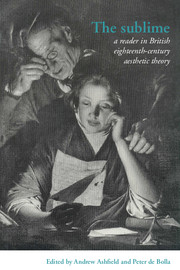Book contents
- Frontmatter
- Contents
- List of Abbreviations
- Introduction
- Part I The Longinian tradition
- 1 Dionysius Longinus on the sublime (1743)
- 2 Remarks on a book entitled, Prince Arthur (1696)
- 3 The advancement and reformation of modern poetry (1701)
- 4 The grounds of criticism in poetry (1704)
- 5 Essays upon several subjects (1716)
- 6 A miscellany of ingenious thoughts (1721)
- 7 An essay on the theory of painting (1725)
- 8 Reflections on the nature and property of languages (London 1731)
- 9 The works (1735)
- 10 Lectures on poetry (1742)
- Part II Rhapsody to rhetoric
- Part III Irish Perspectives
- Part IV The Aberdonian Enlightenment
- Part V Edinburgh and Glasgow
- Part VI From the Picturesque to the Political
- Sources and further reading
6 - A miscellany of ingenious thoughts (1721)
Published online by Cambridge University Press: 05 June 2012
- Frontmatter
- Contents
- List of Abbreviations
- Introduction
- Part I The Longinian tradition
- 1 Dionysius Longinus on the sublime (1743)
- 2 Remarks on a book entitled, Prince Arthur (1696)
- 3 The advancement and reformation of modern poetry (1701)
- 4 The grounds of criticism in poetry (1704)
- 5 Essays upon several subjects (1716)
- 6 A miscellany of ingenious thoughts (1721)
- 7 An essay on the theory of painting (1725)
- 8 Reflections on the nature and property of languages (London 1731)
- 9 The works (1735)
- 10 Lectures on poetry (1742)
- Part II Rhapsody to rhetoric
- Part III Irish Perspectives
- Part IV The Aberdonian Enlightenment
- Part V Edinburgh and Glasgow
- Part VI From the Picturesque to the Political
- Sources and further reading
Summary
Concerning sublimity of style and discourse
What is generally amongst orators and poets called sublime, will be found, upon enquiry, to be the simple effect of energy and number: so that having proved that all languages are capable of the one, there need no arguments to prove them capable of the other: or that they are all equally entitled to every prerogative of eloquence. Any discourse is more or less excellent, according as his ideas are more or less clear, brilliant, and exalted, who composes it; and it will not be denied, I suppose, that extraordinary geniuses may be met with in all languages.
What bears the title of sublime, or marvellous, has been at all times so much in request, that the ancients, as well as some modern critics, have bestowed large treatises upon it: and I suppose, some of them, who have writ abundantly upon this matter, affected to recommend their own works for pieces of elaborate eloquence, whilst they showed by their criticisms, that they understood the rules of art; but the difference is vastly wide between theory and practice.
Longinus is the most ancient author that is to be found upon this subject; and he tells us, that the sublime is that which forms the excellency and the sovereign perfection of discourse…That which transports…That which produces a certain admiration mixed with wonder and surprise ... That which raises the soul, and inspires her with a more exalted opinion of herself.
- Type
- Chapter
- Information
- The SublimeA Reader in British Eighteenth-Century Aesthetic Theory, pp. 43 - 44Publisher: Cambridge University PressPrint publication year: 1996



